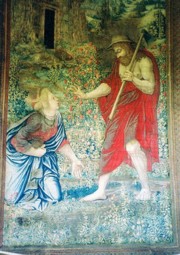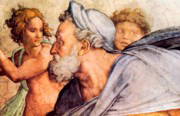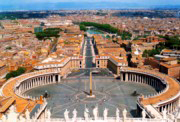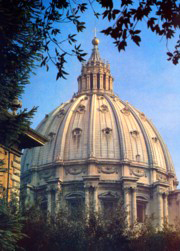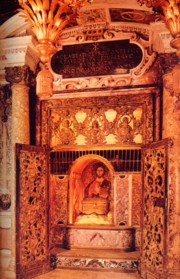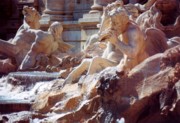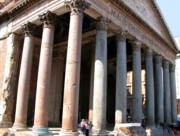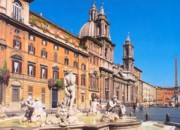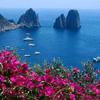
SHORE EXCURSION TO ROME FROM CIVITAVECCHIA (VATICAN MUSEUMS, SISTINE CHAPEL, ST. PETER’S, TREVI FOUNTAIN) FOR DISABLED
Details
SHORE EXCURSION OF ROME FOR DISABLED WITH DEPARTURE FROM THE PORT OF CIVITAVECCHIA FOR VISITING THE VATICAN MUSEUMS, SISTINE CHAPEL, ST. PETER'S BASILICA, TREVI FOUNTAIN, THE PANTHEON AND PIAZZA NAVONA
|
DURATION: | 9 hours | |
|
PRICE: |
View the price list | |
|
AVAILABILITY: |
All-year-round | |
|
THE PRICE INCLUDES: | English-speaking Driver & Accessible air-conditioned Mercedes Car at your disposal for 9 hours THE ENTRANCE FEES AND THE RESERVATION IMPORTANT INFORMATION: | |
SCHEDULE OF THE DAY TOUR TO ROME FROM THE PORT OF CIVITAVECCHIA
|
| Meet with the English-speaking driver and his accessbile Mercedes car (with air conditioning) by the cruise ship at the Port of Civitavecchia |
| Arrival in Rome and meet with our English-speaking expert guide at the Vatican Museums |
| 3-hour guided visit of the Vatican Museums, the Sistine Chapel and St. Peter’s Basilica |
| 1 hour of free time for lunch (not included in the price) |
| Pick-up at the Vatican area and short drive to reach the Trevi Fountain in the centre of Rome |
| 2 hours of free time for the visit of the Trevi Fountain, the Pantheon and the Piazza Navona (without guide) |
| Pick-up close to the Piazza Navona and back to the Port of Civitavecchia |
Explore the treasures of the Eternal city:
This tour route, designed specifically for the disabled, is completely step-free. To avoid the stairs situated in the Vatican Museums, near the Sistine Chapel, and at the entrance to St. Peter’s Basilica, You will use a combination of elevators, ramps, and wheelchair lifts.
Our tour will start from the Vatican area from where You’ll go to visit the great Vatican Museums together with our professional English-speaking guide. They are exceptionally important because of the richness and prestige of the masterpieces brought together under various popes over the centuries, as well as for their sumptuous setting. The museums are made up of a group of grand buildings and countless rooms, salons, museums, galleries, libraries, chapels, corridors, courtyards and gardens rich with art treasures of every type. From the Renaissance on, there was not a great artist who did not leave the immortal mark of this genius here.
The Sistine Chapel is the crowning glory of the museum and Michelangelo’s masterpiece. Years after their restoration, conflict continues over whether too much paint was removed, flattening the figures. On the other hand, the brilliant color has been restored. Whether you like the colors of the drapery or not, Michelangelo’s modeling of the human form is incredible.
After the visit of the Museums, our guide will take you right to the world famous Saint Peter’s. If we walk up the Via della Conciliazione and approach St. Peter’s we discover gradually one of the most impressive architectural complexes ever conceived by the human mind. The centre is dominated by Michelangelo’s majestic and harmonious dome; in front there extends Maderno’s façade overhung by the statues of the Apostles; to the right and to the left the mighty colonnades of Bernini fan out, enclosing what is perhaps the most famous square in the world.
After the 1 hour free time you’ll be picked up by our driver. After a short drive we’ll reach the centre of Rome where you’ll have 2 hours of free time for the visit on foot of the Trevi Fountain, the Pantheon and Piazza Navona.
The Trevi Fountain is the most sumptuous fountain in Rome: Legend has it that a foreigner who tosses a coin into the fountain ensures his return to Rome. Set against a large building, the fountain is decorated with bas-reliefs and statues which stand upon mighty rocks from which the water gushes. Spurts and roars animate the impressive scene.
The Pantheon is Rome’s glory. It is city’s only architecturally intact monument from classical times. Because of the inscription on the cornice of the portico, M. Agrippa L.F. Cons. Tertium fecit, for a long time it was believed that the Pantheon, as it stands today, had been built by Agrippa in 27 B.C. and dedicated to the gods of the Julian family; his temple was actually destroyed by a fire in 80 A.D., and completely redesigned by Hadrian. Other restoration was done under Septimius Severus and by Caracalla in the 3rd century.
On March 16, 609 A.D., Phocas changed the pagan temple into a Christian church, bringing the bones of many Christians from the catacombs and dedicating it to “St. Mary of the Martyrs”, thus ensuring the preservation of the building to this day. In 1929 the church, as a result of the Lateran Treaty, assumed the title of the Basilica Palatina, or more properly the national church of all Italians.
Another place you shouldn’t miss is Piazza Navona, which traces the shape of the Stadium of Domitian, which once occupied this site and held 30.000 spectators. Three magnificent fountains decorate the piazza:
In the center – “an Aesop’s fable fashioned in marble” – is the Fountain of the Four Rivers by Bernini, who designed it as a base for the Egyptian obelisk which was brought here from the Circus of Maxentius. Four figures seated on the rocks represent the Nile, Ganges, Danube and the Rio de la Plata.
The Fountain on the south side of the Piazza, called the Fountain of the Moor, was designed by Giacomo della Porta between 1571 and 1576, but his statues of tritons and masks were later moved to the Giardino del Lago in the Villa Borghese; the statues on the fountain are 19th century copies. The fountain takes its name from the statue of the Moor, which Bernini added in the 17th century.
At the north end of the piazza is the Fountain of the Calderari (Coppersmiths), so-called because of the many workshops in the area. This fountain also lost some of its original statues and its sculptural decoration was only completed in the 19th century.
SUGGESTIONS:
Take water, camera & sun cream. In low season warmer clothing may be required!
